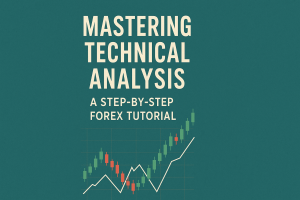What is Forex?
“Forex” stands for foreign exchange; it’s also known as FX. In a Forex trade, you buy one currency while simultaneously selling another.
Currencies trade in pairs, like the Euro-US Dollar (EUR/USD) or US Dollar / Japanese Yen (USD/JPY). Forex trading is used to speculate on the relative strength of one currency against another. The foreign exchange market is an over-the-counter market, which means that it is a decentralised market with no central exchange.
Who trades currencies, and why?
Daily turnover in the world’s currencies comes from two sources:
Foreign trade (5%). Companies buy and sell products in foreign countries, plus convert profits from foreign sales into domestic currency.
Speculation for profit (95%).
Most traders focus on the biggest, most liquid currency pairs. “The Majors” include US Dollar, Japanese Yen, Euro, British Pound, Swiss Franc, Canadian Dollar and Australian Dollar. In fact, more than 85% of daily Forex trading happens in the major currency pairs.
Forex is the world’s most traded market, trading 24 hours a day. With average daily turnover of US$3.2 trillion, Forex is the most traded market in the world. A true 24-hour market from Sunday 10 PM GMT to Friday 10 PMGMT, Forex trading begins in Sydney, and moves around the globe as the business day begins, first to Tokyo, London, and New York. Unlike other financial markets, investors can respond immediately to currency fluctuations, whenever they occur — day or night.
Understanding Forex Quotes
Reading a foreign exchange quote is simple if you remember two things:
1. The first currency listed is the base currency
2. The value of the base currency is always 1.
The US dollar is usually considered the base currency for quotes. When the base currency is USD, think of the quote as telling you what a US dollar is worth in that other currency.
When USD is the base currency and the quote goes up, that means USD has strengthened in value and the other currency has weakened. In other words, a rising quote means that the US dollar can buy more of the other currency than before.
Majors not based on the US dollar
There are three exceptions when the US Dollar is not the base currency of a pair — these exceptions are the British pound (GBP), the Australian dollar (AUD) and the Euro (EUR). For these pairs, the quote is based on the other currency, and a rising quote means that the other currency is strengthening, and the US dollar is weakening.
Cross currencies
Currency pairs that don’t involve USD at all are called cross currencies.
Bids, asks and the spread
Just like other markets, Forex quotes consist of two sides, the bid and the ask:
- The BIDis the price at which you can SELL base currency.
- The ASKis the price at which you can BUY base currency.
- The spread is the difference between the BIDand the ASK, and represents the cost of trading.
In Forex, spreads are tighter than many other markets, making it cost effective to trade on relatively small price movements.
What’s a pip?
Forex prices are generally very liquid, and are usually quoted in very small increments called pips, or “percentage in point”. A pip refers to the fourth decimal point out, or 1/100th of 1%. For Japanese yen, pips refer to the second decimal point. This is the only exception among the major currencies.
Leverage & Margin — Trading on Margin
Leverage trading, or trading on margin, means you aren’t required to put up the full value of the position. As a result, you can open a significantly larger position that you would be able to if you needed to fund your trade in full. No other Financial Market gives you leverage as does the forex market. A 100:1 leverage means that for every £1,000 you deposit, you can trade with £100,000. This gives you the ability to gain substantially by good trades. Trading on leverage increases your potential for profit, but also increases your risks.
More leverage means more opportunity — and more risk. Trading using leverage offers significantly increased profit potential, but it is important to remember that it also means significantly increased risk. Your risks can be limited by monitoring your account, and by using stop losses to set the maximum loss you are prepared to take on any one position.
Calculating Profit and Loss
Most online trading platforms will automatically calculate the P&L of your open positions, but it is useful to understand how this calculation is made to understand your profit and loss potential on each trade.
To illustrate the Forex trade, consider the following two examples.
Let’s say that the current bid/ask for EUR/USD is 1.4616/19, meaning you can buy 1 euro for 1.4619 or sell 1 euro for 1.4616. Suppose you decide that the Euro is undervalued against the US dollar. To execute this strategy, you would buy Euros (simultaneously selling dollars), and then wait for the exchange rate to rise. So you make the trade: to buy 100,000 Euros you pay 146,190 dollars (100,000 x 1.4619). Remember, at 1% margin, your initial margin deposit would be approximately $1,461 for this trade.
As you expected, Euro strengthens to 1.4623/26. Now, to realize your profits, you sell 100,000 Euros at the current rate of 1.4623, and receive $146,230. You bought 100k Euros at 1.4619, paying $146,190. Then you sold 100k Euros at 1.4623, receiving $146,230. That’s a difference of 4 pips, or in dollar terms ($146,190 — 146,230 = $40).
Total profit = US $40.
Now in the example, let’s say that we once again buy EUR/USD when trading at 1.4616/19. You buy 100,000 Euros you pay 146,190 dollars (100,000 x 1.4619). However, Euro weakens to 1.4611/14. Now, to minimize your loses to sell 100,000 Euros at 1.4611 and receive $146,110. You bought 100k Euros at 1.4619, paying $146,190. You sold 100k Euros at 1.4611, receiving $146,110. That’s a difference of 8 pips, or in dollar terms ($146,190 — $146,110 = $80)
Total loss = US $80.
DISCLAIMER
This forex guide is designed to provide helpful advice regarding the subject matter(s) covered. The website owner and contributors do not engage in the practice of providing legal or professional advice and that the laws and regulations governing the subject(s) covered in this guide may vary from state to state, and country to country.
Trading foreign exchange Forex and any other financial markets on margin carry a high level of risk, and may not be suitable for all investors. The high degree of leverage can work against you as well as for you. Before deciding to invest in the financial markets you should carefully consider your investment objectives, level of experience, and risk appetite.
The possibility exists that you could sustain a loss of some or all of your initial investment and therefore you should not invest money that you cannot afford to lose. The information contained here was gathered from sources deemed reliable; however, no claim is made as to its accuracy or content. There is a risk of loss in trading currencies signals, futures and futures options and stocks and stocks options, commodities, metals and others and you should carefully consider your financial position before making any trades.
You must be aware of the risks and be willing to accept them in order to invest in the forex and any other financial markets. Don’t trade with money you can’t afford to lose. All opinions, news, videos, charts, research, analysis, webinars, trading sessions, prices or other information contained on this apple application and website are provided as general market commentary. Spartantraderfx.com will not accept liability for any loss or damage, including, but without limitation to, any loss of profit, which may arise directly or indirectly from use of or reliance on such information.
The content on this Website and application is subject to change at any time without notice and is provided for the sole purpose of assisting traders in making independent investment decisions. The reader accepts that by using this information, he or she will not hold spartantraderfx.com and the owner and operator of the site, responsible for decisions based on information from this site. The information presented with the website is for educational purposed only.




